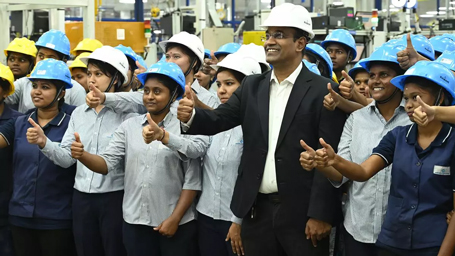
Ganesh Mani, President and Chief of Operations, Ashok Leyland with women workforce at the company’s all-women LCV assembly line at Hosur. | Photo Credit: Bijoy Ghosh
Leading truck and bus maker Ashok Leyland said its upcoming electric small trucks will be manufactured out of its LCV (light commercial vehicle) facility at the company’s Hosur production complex.
The Hinduja flagship has already indicated that it would be launching two new electric small trucks – electric Dost and electric Bada Dost as part of its broader plans to grow the LCV volumes with new product rollouts.
“The new electric small truck will come from our existing LCV line here and our lines are getting aligned to the production of such products,” Ganesh Mani, President & Chief of Operations, Ashok Leyland told businessline at the all-women LCV engine assembly line, housed at the Hosur factory.
He said the company was closely working with its subsidiary company Switch Mobility, which will be selling the electric products of the group. “Our job is to assemble all those vehicles here,” he added.
“The capacity for LCV products won’t be a challenge as it has already ramped up the overall capacity by 15-20 per cent in the past two years. We are future-ready in terms of capacities,” he stated.
In FY23, the company clocked its highest-ever LCV volumes of about 67,000 units with better price realisations. Its previous major launch was in 2020 when Bada Dost was introduced to the market. “We want to be a full range player in the LCV category and going forward we will bring out products in new and existing segments both in ICE and electric variants,” said Mani.
Focus on digital excellence and flexible operations
As the company will roll out more products, its manufacturing operations will lay a stronger focus on three key areas – digital excellence, maintaining flexible operations, and building capabilities to introduce a new line of models in the ICE segment as also in alternative fuel segments.
Since the majority of its demand is for the AVTR platform, which is a modular one, the company has strengthened the capabilities for the same across the south and north factories.
On the digital side, it is working on the lighthouse concept. As part of this, the company has rolled out an initiative called MPAS – Manufacturing Process Assurance System, which is an IoT-enabled process to make sure that its production process is assured for the quality requirements.
While discussing the all-women LCV engine assembly line, Mani said: “It has been a phenomenal experience. Ever since we started in March, the team was able to reach peak capacity and meet quality standards in a very short period.” “This entire setup is unique as it is exclusively staffed by women, who handle both shop floor and non-shop floor tasks. The team is enthusiastic to surpass any kind of targets set for them,” he said.
Achieving record production in a short period
All engines that go into LCV products such as Dost, and Bada Dost are assembled by women in the assembly line, which has incorporated industry 4.0 features, and are part of the Hosur factory. About 80 women are working in the assembly line, which has a capacity of 62,000 engines per annum. In about 75 days, the all-women team was able to achieve production from zero to 120 engines a day on a single shift, which is reported to be higher than the previous production peak.
About 10 years ago, Ashok Leyland’s Pantnagar factory (Uttarakhand) trained and deployed a substantial number of women to make medium and heavy trucks. Some of the lines are headed and managed by women now.
Courtesy: HBL
|
